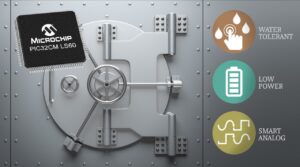Security threats are growing in complexity and causing product development challenges in the Internet of Things (IoT), consumer, industrial, medical and other markets. It is critical that these products have strong built-in security while at the same time offering low power consumption for longer battery life.
 Microchip Technology announced the release of the industry's first microcontroller (MCU) to combine a secure subsystem and Arm TrustZone technology in a single package. The PIC32CM LS60, which integrates Microchip's Trust Platform secure subsystem, facilitates end-product development using one microcontroller rather than two or more semiconductor chips.
Microchip Technology announced the release of the industry's first microcontroller (MCU) to combine a secure subsystem and Arm TrustZone technology in a single package. The PIC32CM LS60, which integrates Microchip's Trust Platform secure subsystem, facilitates end-product development using one microcontroller rather than two or more semiconductor chips.
Now designers can turn to a trusted source to find a 32-bit MCU designed to protect products and the end user from remote or physical attacks on their smart home devices, smartphone or tablet accessories, portable medical devices, wearables, devices connected household appliances and industrial robots.
As the IoT industry continues to grow rapidly, the need for edge devices to be secured with high standards of protection has become essential. The PIC32CM LS60, with its combination of easy-to-use Arm TrustZone technology and the Common Criteria Joint Interpretation Library (JIL), the highly rated Trust Platform secure subsystem, enables developers to implement industry-proven security practices and countermeasures to protect against a broad class of known remote and physical attacks.
These types of projects are supported with tools such as MPLAB Code Configurator (MCC) TrustZone Manager and Trust Platform Design Suite to simplify secure subsystem configuration. The Microchip Trust Platform provisioning service is available to securely provision keys and certificates.
“By integrating Arm TrustZone technology and Microchip's secure subsystem into a single package, the PIC32CM LS60 is an offering the likes of which the market has never seen before,” said Rod Drake, vice president of Microchip's 32-bit MCU business unit. Technology. “We believe the security, ease of use, and low-power operation of this MCU will be a powerful game changer in implementing advanced security technology in IoT applications.”
With the increasing adoption of touch capabilities in waterproof wearable devices and modern appliances, embedded systems designers are challenged to develop touch interfaces that work well in noisy and humid environments. The PIC32CM LS60 integrates an enhanced peripheral touch controller with the Driven Shield Plus feature that prevents false touches due to moisture and provides high noise immunity to enable exceptional touch interfaces.
Additionally, the device has core-independent SleepWalking peripherals and the Event System. These peripherals keep the MCU core in sleep mode for long periods to reduce power consumption. It also comes with on-chip analog that includes operational amplifiers (op-amps), digital-to-analog converters (DACs), and analog-to-digital converters (ADCs) that can be operated in sleep modes and interfaced with a variety of sensors.
The PIC32CM LS60 is compatible with MPLAB Data Visualizer and Power Debugger tools that can be used to monitor, analyze and adjust power consumption numbers in real time. This makes it easier for customers to develop low-power applications and bring long-battery life products to market faster.
Development Tools
Microchip offers the following development tools and services to support the PIC32CM LS60 and its variants: Trust Platform Provisioning Service, Trust Platform Design Suite (TPDS), MPLAB Harmony v3 platform with MPLAB Code Configurator for Arm TrustZone, Touch Library, Touch Configurator, MPLAB Data Viewer, Power Debugger, PIC32CM LE00 Curiosity Pro Evaluation Kit, PIC32CM LS00 Curiosity Pro Evaluation Kit, PIC32CM LS60 Curiosity Pro Evaluation Kit, PIC32CM LE00 Ultra-Low-Power, Water Tolerant Touch Reference Design, Environment integrated development (IDE) MPLAB X and its ecosystem of debuggers, programmers and compilers.

